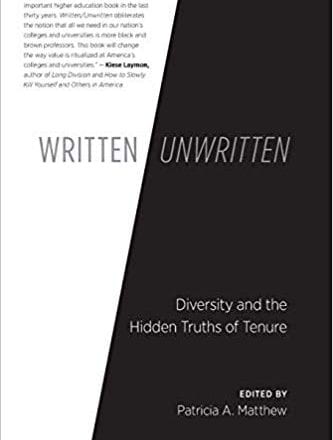Written/Unwritten: Diversity and the Hidden Truths of Tenure, Ed. Patricia A. Matthew (U North Carolina Press, 2016). Ebook available via the Sojourner Truth Library.
Come join our discussion via WebEx
https://newpaltz.webex.com/newpaltz/j.php?MTID=m46c82a8b119489cc09e3225350a73509
Date: Thursday, March 26 Preface & Chapter One
Time: 3:00 – 4:00 p.m.
Isidoro Janeiro, Sarah Wyman, Anne Balant, and others will be discussing the introduction and first chapter (interview with Houston A. Baker, Jr.) on the cultural landscape of predominantly white institutions (PWI) for faculty of color.
NOTES
Introduction
We still need to figure out the ways in which the academy is structurally hostile to diversity and how to unpack the unwritten codes that underscore various personnel policies (formal and informal) that make it difficult for faculty of color to succeed (Matthew xv).
The “best” or “most qualified” person is offered the tenure track position, and evaluation processes rely on words such as “excellence,” “rigorous,” and “innovative.” These ideas and words are not in and of themselves discriminatory, but they are more subject to cultural forces than many in the academy will allow. In much the same way that race is a social construct, so are notions of excellence, and those notions are constructed by people who often unknowingly seek only to acknowledge and reward those qualities they see in themselves or wish they possessed (9).
This is not to suggest that the idea of having standards is racist, but when those standards are invented by the majority culture, it is a mistake to assume that diversity gaps are a result of a lack of qualified faculty of color (9).
James D. Anderson on Fred Wale’s 1945 project to place African-American faculty in PWIs: “The practice of proclaiming one’s devotion to meritocratic principles, while actually perpetuating traditional patterns of ethnic discrimination and exclusion, transformed theoretical enemies (i.e. racism vs. meritocracy) into pragmatic friends” (9-10). [Wale’s campaign resulted in 23 faculty of color joining PWIs.]
The reality… is that the academic workplace is characterized by struggles over the definition of knowledge and about what it means to be a knowledgeable person (11).
Navigating those networks can be difficult for anyone, but add race to the mix and it is all too easy to end up in a minefield with colleagues and administrators who use tenure not to reward accomplishment and potential but as a way to weed out those who simply don’t fit in intellectually, socially, or culturally (11).
There is no class on how to respond when someone says to a candidate of color, during a campus interview, “While we’d like to diversify the department, we will make an appointment on merit, and will look for the best candidate (11).
[Black faculty’s] subject position as “racialized other” can trigger anxiety and a kind of racist Tourette’s syndrome in white colleagues who haven’t done the work of thinking carefully about race (12).
Audre Lorde explained in her address to the National Women’s Studies Association conference, it can be precisely because white women face sexism that they are blind to their own oppressive conduct. In 1981 she posed a challenging question: “What woman here is so enamored of her own oppression that she does not see her heel print upon another woman’s face?” (16).
Responding to the Call(ing): The Spirituality of Mentorship and Community in Academia
An Interview with Howard A. Baker, Jr.
There is an inferable connection between family and vocation. What I mean by this is: Because my older brother (hence “family”) had found his way to Wall Street and had come in contact with a network of well-endowed and well-placed white professionals – he learned what the then “professional marketplace” was looking for with respect to Black. His access to information from within the system, as it was, and his passing it on to me resulted in my amazing first academic post [Yale] (31).
I was young, though, and perhaps to naïve, and felt I could convert to an energetic Black aesthetic activism without professional consequences (32).
The very first misconception would be that there’s a difference between affirmative action, the seeking out of difference to infuse and energize a program, and merit (33).
The biggest mistake departments make is that they believe there can somehow be a quantifiable number that is called “enough difference” (34).
It’s probably good to go to the gym or for a run at the end of an academic workday. Health is really important, and physical healthcare is so necessary, particularly for Black academics (35).
Mentorship is absolutely important, and although it comes with benefits, it also has its incumbencies and obligations for the person who seeks out the mentor. The ability for those mentored to seek out mentors and seriously to listen to them and to make the connection is hugely productive and gratifying (38).
The principal consideration of any mentor-mentee interaction is empathy – a reading out of the best intentions and cultivation of the most outstanding performance that one can imagine (39).
What might be called the new Black university and college student elite are likely to be just as blasé about their advantages and as naïve about what constitutes a truly well-educated person as those students from any other blasé “racial elite” (39).
There is a current trend for some Black college university students to self-fashion themselves as “postracial,” beyond definitions, boundaries, and burdens of racial identification with the concerns and conditions of the Black majority (40).
Writing for publication in refereed venues is quintessential to the process of intellectual growth, to academic and personal self-confidence (40).
The Yale community also showed me scholastic commitment in the sense that we must rewrite the canon and the books and alter the epistemologies of a form of knowledge production and dissemination that has been inimical and harmful in its racial terror to the Black majority (42).
Black community is, as Langston Hughes said, “a flame of the spirit burning through the ages” (43).







